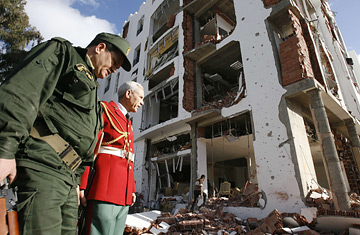
Republican guards walk near the site of a bomb blast at the Constitutional Court building in Algiers
Viewed from Europe, Tuesday's deadly bombings of government and United Nations buildings in Algiers offers a prime example of how the threat of terror is rising even as it becomes more complex. Though its strikes have thus far been limited to Algerian soil, the group claiming responsibility for the strikes — al-Qaeda in Islamic Maghreb (AQIM) — has signaled its desire to internationalize its jihad. With Tuesday's violence marking the first time AQIM has struck foreign targets in a major attack in Algeria, security officials fear it signals a significant broadening of the group's terror action that will inevitably reach Europe itself.
"Probably the biggest threat to us today is the scenario of a small, well-prepared group of Algerians making it to France without detection, and quickly unrolling an attack," a French intelligence official tells TIME. Interviews with French intelligence and counter-terrorism officials indicate recent busts of jihadists groups in France have uprooted networks seeking to recruit and transport young militants to fight U.S.-led forces in Iraq. The last group caught working toward an attack against France dates back to September 2005 — and had been working on instruction of AQIM's earlier incarnation, Salafist Group for Preaching and Combat. "That doesn't mean there might not be French cells plotting violence that we may have missed," says one investigator. "But when you compare what's happened lately in France and Algeria, Algerian extremists seem the far more likely source of terror on either continent in the short-run."
That's especially true, authorities say, given the tactics employed by AQIM. Signature attacks have alternated smaller strikes on police and military outposts with major operations like the double car-bombing of government buildings last April that killed 33. Targets have been mixed between symbols of the Algerian state whose location also assures civilian casualties, and hit-and-run attacks on employees and infrastructure of foreign businesses. Tuesday's bombing showed an intersection of those variables, with the first massive explosion rocking the Algerian constitutional and supreme courts; and the second badly damaging the U.N. High Commissioner on Refugees and U.N. Development Program buildings. At least 67 people were killed in the strikes, including at least 11 U.N. workers.
To prevent this feared transfer of terror across the Mediterranean, French officials say they need — and usually get — help from Algeria. Yet concerns that the Algerian regime may overestimate its successes fighting terrorist organizations troubles some French authorities. For example, Algerian officials and commentators indicated as recently as this year that military offensives and amnesty programs have decimated AQIM ranks, only to be quickly bloodied anew by spectacular attacks. Some critics also contend that underestimated official death counts indicate the regime may prefer to deny the extent of civilian suffering rather than acknowledge AQIM's deadly effectiveness. Within 24 hours of Tuesday's blasts, for example, the official death toll of 26 was less than half of the 67 or more reported by hospitals.
Meanwhile, though AQIM numbers have indeed dwindled from thousands to a few hundred within the last few years, it's also been revived by an injusion of new blood. Recruitment among youths from Algerian slums has boomed over the past two years. Worse, some French officials say there are signs that some of the hundreds, perhaps even thousands of Algerian men who flocked to join the Iraqi insurgency may now be returning to turn their combat and terror experience against the Algiers regime.
To confound security matters further, Algerian jihadists are far from the only threat to Europe. The French intelligence officials say the U.K. faces a far greater menace from its own home-grown, swiftly-radicalized youths who may wind up getting inspiration and help for attacks from extremist contacts in Pakistan. Germany, meanwhile, has drawn the ire of militants with ties to jihadist groups that have formed at the margins of the Iraqi war in Syria and Lebanon. And all countries have been surprised to find converts at the heart of both successful and thwarted terror strikes. "Anyone who thinks they're figuring things out and have gotten control of this threat is in dire danger of learning otherwise," the French investigator says of his peers. "It's constantly changing, which makes it constantly dangerous."
